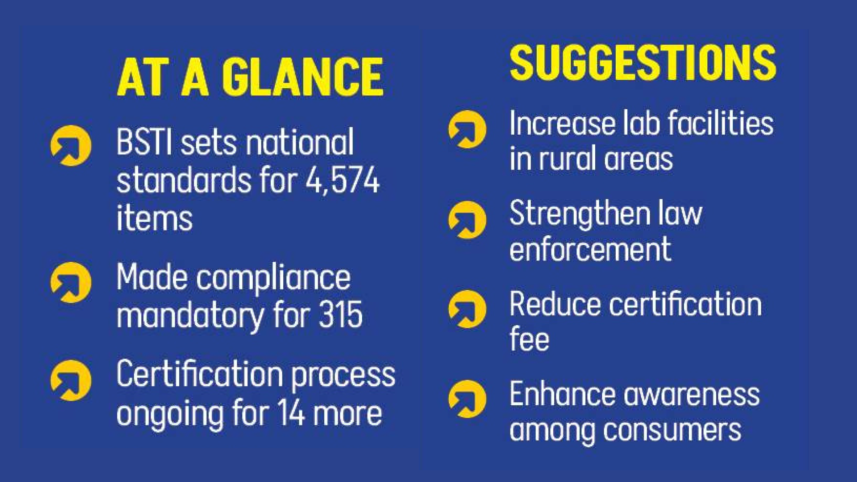World Standards Day: ‘Far from reaching the level needed’

Bangladesh continues to grapple with ensuring the quality and safety of its products, even after setting national standards for more than 4,500 items and making certification mandatory for 315 of them.
Many goods -- from food and construction materials to daily essentials -- still fall short of acceptable standards thanks to weak enforcement, limited lab facilities in rural areas and poor awareness among producers, according to analysts and stakeholders.
Amid this backdrop, Bangladesh is observing the 56th "World Standards Day" today to raise awareness about product and service quality.
To mark the day, the BSTI has announced various programmes, including a seminar at the Krishibid Institution Bangladesh in Dhaka.
Although products are labelled BSTI certified, consumer awareness of what that means remains limited, said Eleash Mridha, managing director of Pran Group, a major manufacturer, processor and exporter of fast-moving consumer goods.
If all relevant bodies, the BSTI, the City Corporation and the Bangladesh Food Safety Authority could coordinate under a unified regulatory framework, it would create a much more efficient system.
"Manufacturers would benefit from clearer guidelines, consumers would be better protected, product quality would improve, and we'd be in a stronger position to compete internationally and grow our exports," he added.
Although BSTI has set standards for thousands of products, implementation and monitoring are weak, said AHM Shafiquzzaman, president of the Consumers Association of Bangladesh.
Relying solely on government agencies with outdated processes and limited manpower will hold back progress, he said, while calling for allowing competent private institutions to participate in quality testing and standardisation.
"Ultimately, the goal is to protect consumers and build trust in Bangladeshi products at home and abroad through a more accountable, collaborative quality control framework," he added.
Businesses complained about the lower standard of the BSTI in the global market, said Abdul Hasib Chowdhury, pro-vice chancellor of the Bangladesh University of Engineering and Technology.
"We are still far from reaching the level we need -- achieving that height will take much more time and effort," he added.
Most consumers don't pay much attention to whether a product carries the BSTI logo, said Khurshid Ahmad Farhad, general manager of Bombay Sweets.
"For the local market, BSTI standards are adequate, but for global operations, we must also meet international standards."
A product may meet all ten parameters under BSTI, but only six or seven might align with global benchmarks such as those in Japan, the US, Europe or Australia.
"Higher benchmarks boost quality and global competitiveness. Ideally, there should be at least 10,000 products under BSTI's standard list to improve consumer confidence and product quality," he said.
However, Pran's Mridha said the BSTI's standards are generally aligned with international benchmarks.
"While some areas may still be weak or outdated, regular reviews and updates are helping us move closer to global norms," said Mridha.
For instance, under a bilateral agreement, India accepts some of Pran's products based on BSTI certification, even though additional lab tests and inspections are sometimes required on their end, he added.
"Our laboratories are strong and meet international standards, as recently confirmed by experts from the Royal Danish Embassy," said Md Saiful Islam, director (Certificate Marks) at BSTI.
There is a dedicated Halal laboratory to test imported food products for Halal compliance, which is especially important in a Muslim-majority country.
Islam said they are establishing district-level labs tailored to local industries, such as textile labs in Sirajganj and heavy industry labs in Bogura, under a project.
"We are developing an app so consumers can verify product licensing easily and with confidence. Even if a product has the logo, consumers can call or check online to confirm the license and authenticity."
Currently, 315 products are under compulsory standards, chosen based on public importance and industry need, while 14 more products, including energy drinks, are being considered for mandatory certification, he added.





 For all latest news, follow The Daily Star's Google News channel.
For all latest news, follow The Daily Star's Google News channel.
Comments